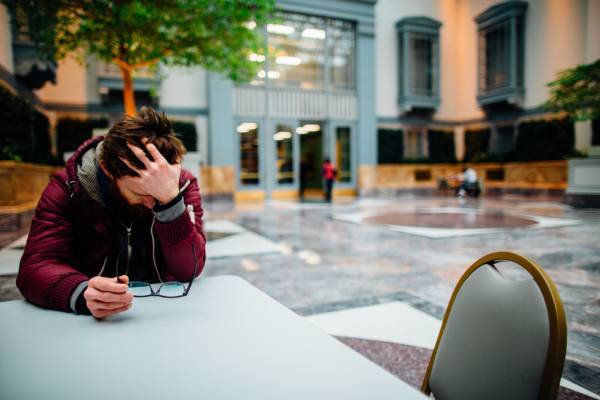
Anxiety is the initial stage of stress reaction and is associated with the subconscious mobilization of the body’s mental forces to overcome a potentially dangerous situation (even if the danger exists only in the imagination!).
What we feel in the body when we are alarmed:
– rapid heartbeat;
– strong vegetative reactions (diarrhoea, nausea, sweating, redness of the skin, rapid breathing, can increase pressure);
– trembling in the hands, legs become “wobbly.”
How anxiety appears:
- a strong uneasiness;
- weak self-control;
- loss of ability to assess your actions and thoughts.
Anxiety actions: chaotic, illogical, thoutghtless.
High (severe) anxiety literally blocks mind and logic – that’s why this state can carry big problems – because a person can’t act in accordance with the situation!
How to help another person with an anxiety attack:
– talk to the person to help determine the source of the alarm, although sometimes it’s not easy. Let him speak out, talk about his anxieties. The enemy should be known in person: if the vague anxiety will form into a clear fear – it will be easier to fight with it;
– help the person to find the missing information: what you need to know, where, what can be done now, make a plan of actions.
– offer to do breathing exercises: breathing in, slow breathing out. Control this process, directing the person’s breath with words “come on, breath in – breath out”, breath in and loud breath out through the mouth, breathing on six counts: 1-2 breath in, 3 breath-holding, 4-5-6 long breath out till emptying the lungs;
– try to distract the person: here can help the attention games, interaction games (anything: with cities, words, who will find more items of blue in the room, etc.)
– help to relieve the tension by physical activity – to actively move, to wring, to squat – the anexiety is afraid of movement, because the movement overextends the muscles, releases tension outwards, rather than hides inside, and helps to relax after activity.
Not recommended:
– to criticize, to argue, to devalue the worries of a person “what have you come up with there!”, “well, you are as always”, “all of this are stupidities!”;
–to leave a person alone with his worries;
– to lie, to give false encouraging information.
How to help yourself with anexiety:
– “ground yourself”: feel the ground under your feet, feel that you are standing on a hard surface. Lay down on the floor, concentrate on physical feelings: what do your hands, legs, back feel. Exercise allows you to feel physical support, which helps to balance the emotional state;
– do breathing exercises and physical exercise, on the same principle as described above;
– strain all the muscles of the body and fix them in this state for 5 seconds, then relax. Repeat 7-10 times;
– get distracted: in a public place you can watch people, count all the windows within sight, all people with red clothes;
– anxiety is afraid of the facts: concretize what exactly you are worried about (I worry what will happen…(what exactly?), analyze every answer and its theoretical probability.
Self-therapy can be an essential tool for personal growth and self-improvement.
Browse through our courses and see the positive changes they can bring to your life.
You are not sure where to begin?